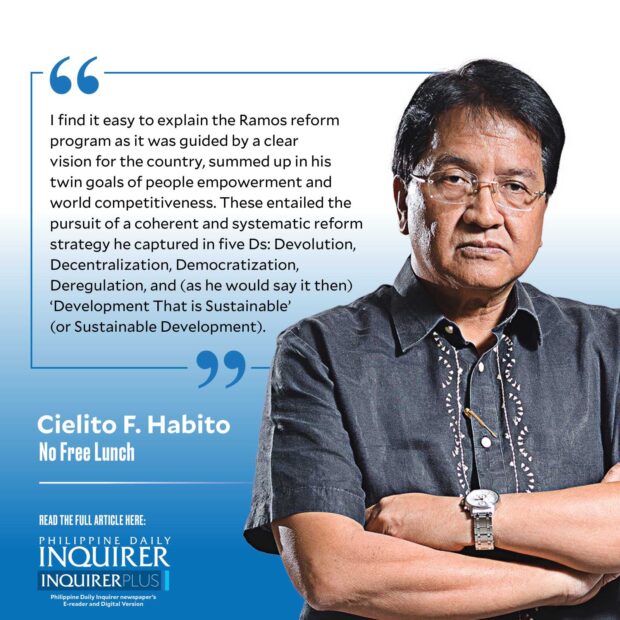Ramos’ 5D strategy
I delivered yesterday the third in a series of monthly lectures by former heads of the National Economic and Development Authority (Neda), held at the University of the Philippines School of Economics (UPSE) in Diliman, Quezon City. The series commemorates 50 years of economic policymaking, supported by research from UPSE’s Philippine Center for Economic Development, which celebrates its 50th founding anniversary this year.
My task was to expound on the economic development strategy and program pursued by President Fidel V. Ramos in his six-year leadership of the country in 1992-1998, which I was privileged to serve in its entirety. This is unlike my predecessors and successors whose tenures ranged only from one to four years, with the notable exception of Dr. Gerardo Sicat, who served the extended Marcos Sr. presidency for 11 years. It probably helped in Ramos’ case that the same person who led the crafting of his 1993-1998 Medium-Term Philippine Development Plan also oversaw its implementation throughout its entire duration.
I find it easy to explain the Ramos reform program as it was guided by a clear vision for the country, summed up in his twin goals of people empowerment and world competitiveness. These entailed the pursuit of a coherent and systematic reform strategy he captured in five Ds: Devolution, Decentralization, Democratization, Deregulation, and (as he would say it then) “Development That is Sustainable” (or Sustainable Development).
Devolution meant asserting the sound governance principle of subsidiarity that was upheld in the Local Government Code of 1991 enacted by his predecessor, President Corazon Aquino. It holds that decisions and actions are best undertaken at lower levels of governance closest to the problems they seek to address. It was remarkable how President Ramos caused a palpable change of attitude among local government leaders throughout his tenure. Early in his term, public forums on his provincial trips — with some of us Cabinet members always in tow — typically had local politicians presenting him with wish lists of assistance being sought from the national government. But he was no Santa Claus. His typical response was to challenge them to “cook their bibingka” with fire from the bottom complemented by fire from the top while combining ingredients contributed by various stakeholders in true active partnerships. He would leave them with his trademark thumbs-up challenge: “Kaya ba natin ito?” to which the crowd would shout out, with thumbs up, “Kaya!” I was personally amazed at how toward the end of his term, those public forums no longer had local leaders presenting him with wish lists. Instead, they gave proud reports on what they had effectively done for themselves. Was it to last? Sadly, that’s another story.
Decentralization pertained to the wider dispersal of economic activity across the country. Ramos’ first order of business was to give long-overdue preferential attention to Mindanao. When I called his attention in 1992 to how Mindanao only received nine percent of the infrastructure budget we inherited, he directed the tripling of this share by 1995. He established the Mindanao Economic Development Council (upgraded by law in 2010 to the Mindanao Development Authority) to oversee development in that lagging southern island group and caused the crafting of the Mindanao 2000 Development Framework Plan.
His decentralization thrust also included the establishment of regional agro-industrial centers or RAICs in all administrative regions of the country. He strengthened the Regional Development Councils as coordinating bodies for regional development. And like his predecessor, he appointed a Cabinet Officer for Rural Development or Cord for every region of the country, to act as chief shepherd in the Cabinet for his/her assigned region. To bring government closer to the people, he held frequent full Cabinet meetings out in the regions. Each time, groups of Cabinet members first went on field immersion visits, reporting their observations in the full Cabinet meeting in the afternoon.
I will discuss the remaining Ds in my next articles. In all of them, there remain useful lessons for today.
















